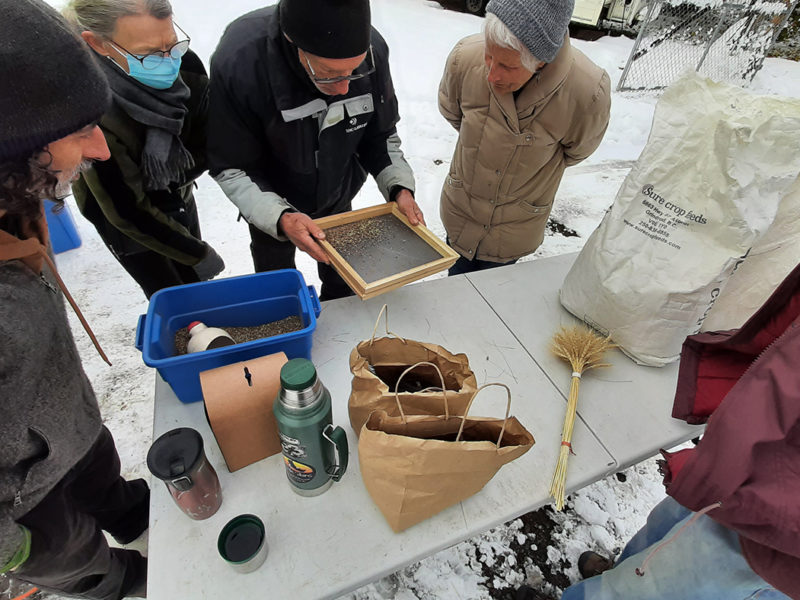LANGLEY – Onset of the COVID-19 pandemic saw seed orders by home gardeners surge, so much so that some seed companies delayed shipments until orders from commercial growers were filled.
Between April 1 to August 31, the BC Eco Seed Co-op saw an 847% increase in sales over the same period in 2019. About 350 bulk seed items were purchased and many farmers who ordered bulk seed also ordered packets.
The co-op undertook a $15,000 crowdfunding campaign this fall to support conversion of a trailer that will provide additional space for its work, which supports seed production for both gardeners and farmers. To join, co-op members must be able to supply seed in commercial quantities, not just packets for home gardeners.
“BC farmers are the largest consumers of organic seeds in Canada,” says Keeley Nixon, the co-op’s coordinator. “They spend almost $10 million a year to obtain the precious seeds. But the supply of local organic seeds is not keeping up.”
Lana Braun, co-owner of Hummingbird Farm in Nelson, grows cut flowers and finding organic seed is a challenge. She plans to join the seed co-op in order to make things a little easier.
“It’s a pretty niche market,” she says of organic cut flowers. “Because of this, it’s epically hard to find certified organic cut flower seeds.”
She started saving her own seed out of necessity and after five years of doing so, met David Catzel of Glorious Organics in Langley, a co-op member and seed program coordinator with FarmFolk/CityFolk in Vancouver.
“He was super encouraging and I felt like we could provide an interesting dimension in the flower perspective,” says Braun. “I knew there was a market for this.”
Co-op advantage
By joining forces with the co-op’s 18 other members, she’ll supply seed to the
co-op which then takes on the marketing, sales, packaging, shipping and more.
The co-op will enable Braun to supply seed without having to build the marketing, packaging and distribution infrastructure herself.
“They have done so much as a group to create the context to enable a new grower to come in,” she says. “Basically, I just give them the seed and they do everything else. If I had to do this on my own, there’s no way.”
She values her ability to support field-to-vase flowers and feels the “slow, local flower movement” began shortly after the similar food movement, about five to 10 years ago. Her estimate is that there are about 50 specialty cut flower growers around the province trying to source organic seeds. Selling seed also creates another revenue stream.
“Any farmer, by their nature, is looking for more avenues to market their products. It was a product that I was already creating just for myself on a small scale,” she says. “Because it’s a co-op it’s really a limited risk to test it and try it.”
Catzel says that any seed company he has contacted has seen sales at least 300% above normal during 2020. The orders have continued, pointing to sustained growth.
“Seed work has definitely gotten very busy,” he says. “But farmers didn’t plant more than 300% of seeds. We just have to make sure we grow more seeds.”
Growing opportunity
Alex Augustyniak, general manager with West Coast Seeds in Delta, says a lot of farmers are looking to get into seed production. He says the volume of sales hasn’t slowed down, even with the onset of fall.
“Usually, we get a little bit of a break, but this year, no,” he says. “People are buying tomatoes and peppers now. They want to make sure they have the varieties they want.”
Farms are also ordering seed early.
“Back in June they were starting to kick in,” he says. “Farmers noticed that [increase in sales] and thought, ‘I better put my order in earlier.’ They’re concerned, or just getting prepared.”
West Coast Seeds regularly attends events to meet farmers and learn about new varieties. It’s also part of the All-America Selections program that tests new varieties of seed and has a quarter-acre test garden.
“We’re always talking to people and we’re looking at different varieties,” he says. “The majority of the players we’re dealing with, they’ve been doing it for four generations.”
Catzel says BC residents and businesses purchase $25 million in vegetable seeds every year, just a fraction of which is produced in-province. This means there’s plenty of room to grow local seed production.
“There’s interest in farmers in doing this work, but it’s just not part of their business model,” he says. “I think that’s starting to change now, … [but] it’s a very long-term picture. A sustainable seed system is going to take decades of training and learning and collaboration.”


 Activists plead not guilty
Activists plead not guilty